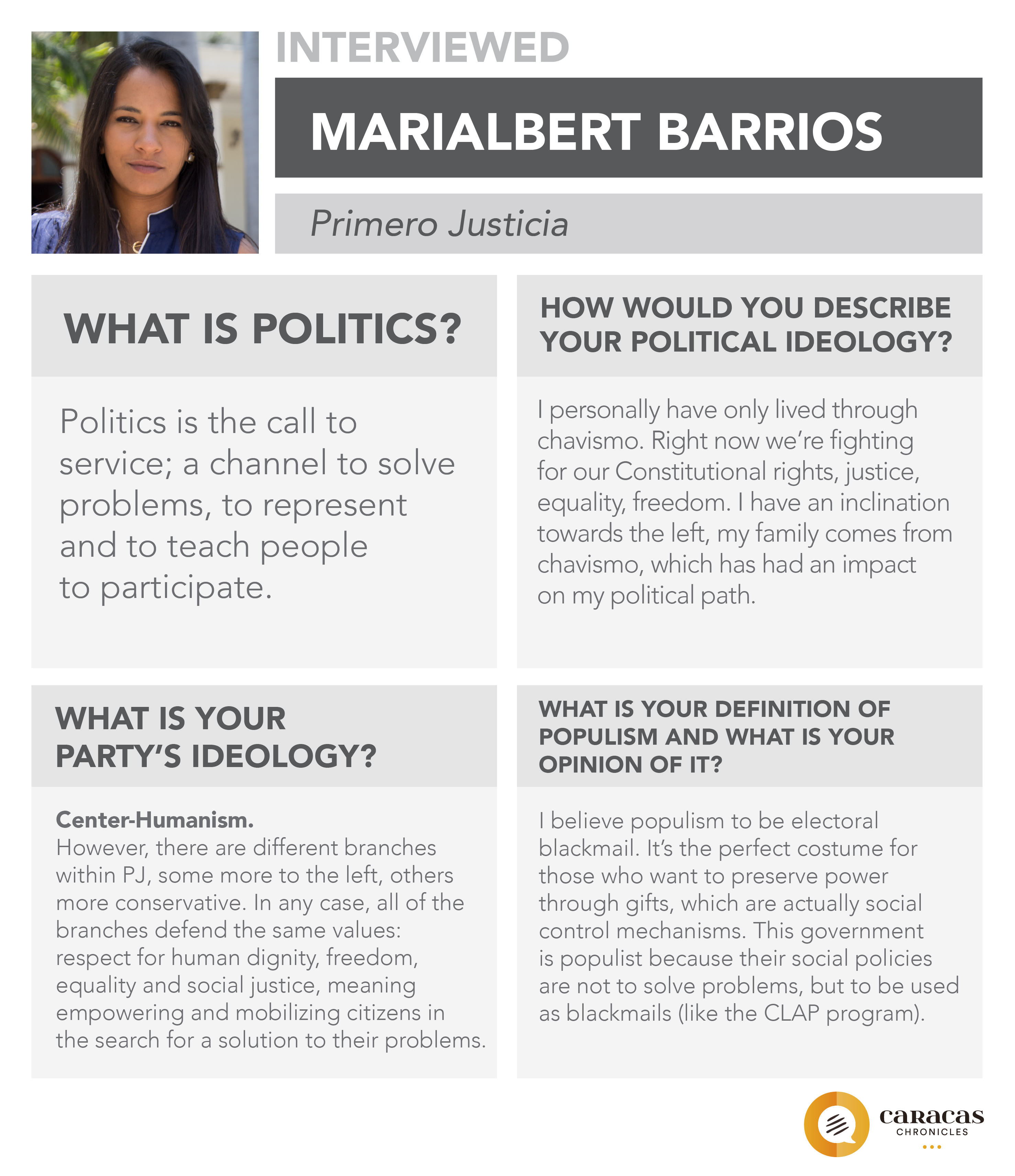Caracas Chronicles’ Young Politicians Series: Marialbert Barrios
Marialbert Barrios was 25 years old when she was elected as deputy for Primero Justicia, the youngest deputy in the current National Assembly. She frequently visits the community that elected her, not only in electoral season. Educating the population is her priority.


Photo: Daniel Lara
Marialbert Barrios is the youngest deputy in the current National Assembly. Graduated from the Universidad Central de Venezuela in International Relations and elected in 2015, at 25 years old, as deputy from Primero Justicia (PJ) for one of Caracas’ toughest districts (Sucre/La Pastora/El Junquito, a chavista stronghold), she sees her growth, through the work with fellow activists in her community, who lead by example in the midst of great adversity, as her greatest achievement.
 The role of the politician is to serve, to think collectively, to support the solution of problems by the correct application of public policies
The role of the politician is to serve, to think collectively, to support the solution of problems by the correct application of public policies
Marialbert’s main role as deputy has been supporting her community and voting base, by empowering people, giving them tools and teaching them about their rights and duties as described in the Constitution. “This has helped me grow as a leader, because they know I don’t visit only in electoral season.”
If the opposition were in power, Marialbert would like to marry her two passions: international relations and the “barrio.” After graduation, she wanted to be an ambassador but couldn’t attend the Institute of Higher Diplomatic Studies Pedro Güal, for opposing this government. Initially her role was behind the scenes, an operative with vocation to serve her fellow citizens, and she took that with her in the assumption of a political office. She believes that, in the international arena, you can be an advocate for the problems that the Venezuelan barrios face. “The global agenda challenges, as described by the Sustainable Development Goals of 2030, in particular the first four (No Poverty, Zero Hunger, Good Health and Well-Being and Quality Education), are the urgent challenges that our most vulnerable communities face.”
We need to develop public policies to make Venezuelans independent from the State
If Marialbert were president today, her immediate priorities would be poverty, education and employment. In the short term, the State would have to provide help for the most vulnerable, while investing in education and the economy, to provide employment and eradicate poverty in the medium and long terms.
She talks about solidarity in the immediate alleviation of poverty, especially with networks of female empowerment. “In Venezuela, women lead 48% of households, and these are some of the most vulnerable households in the country.”
Instead of investing on banners with the president’s face, I’d invest in teaching people to be good citizens
Talking about crime, Marialbert considers Venezuelan security forces need to have a complete inspection and overhaul, especially in incentives against corruption.
She also believes the State needs to invest in civility, teach people to be good citizens. Crime is prevented when a network is formed between the executive, the institutions and the citizens. “There’s no use for disarming police departments, or better salaries for police forces, if we don’t educate the population.”
For Marialbert, civil rights have taken a back seat to other problems, like 82% of Venezuelans living underneath the poverty line. She believes once things change, these issues will be taken care of by the competent institutions, including the National Assembly. She believes in participative democracy, as inscribed in the 1999 Constitution, because it gives power to the people to bring about the necessary changes themselves.
“As we advance, and move away from the present crisis, we’ll have chances to work on these issues. For example, legalizing abortion is something that won’t be too big of an issue, in a country with the highest maternal mortality rate in Latin America.”
Negotiations are a tool and the fundamental process to overcome this crisis is an election, with the warranties described in the Constitution
Ms. Barrios thinks negotiating is the art of cooperating, integrating. “If one of the parties in a negotiation isn’t invested, there can be no results.”
Even if there haven’t been concrete results, Marialbert looks at the negotiations between Israelis and Palestinians, two peoples that have attacked each other for decades, but still keep agreements, maintain a conversation and even share territory, as an example of what can be achieved when two parties decide to cooperate.
The end of this crisis is a legitimate election, and the Constitution gives us the precise steps to take
Marialbert believes a new election is possible through pressure, either by negotiation or protests. “I’m sure that this government will end up calling a legitimate electoral process, because the situation, as it stands, is ungovernable. They should think about the easiest exit strategy.”
Deputy Barrios thinks there must be pre-established rules between opponents, founded in the Constitution, and to make sure the regime abides by them, national and international pressure is necessary. Together with pressure from the chavista establishment which, she underscores, has already materialized.
Caracas Chronicles is 100% reader-supported.
We’ve been able to hang on for 22 years in one of the craziest media landscapes in the world. We’ve seen different media outlets in Venezuela (and abroad) closing shop, something we’re looking to avoid at all costs. Your collaboration goes a long way in helping us weather the storm.
Donate




